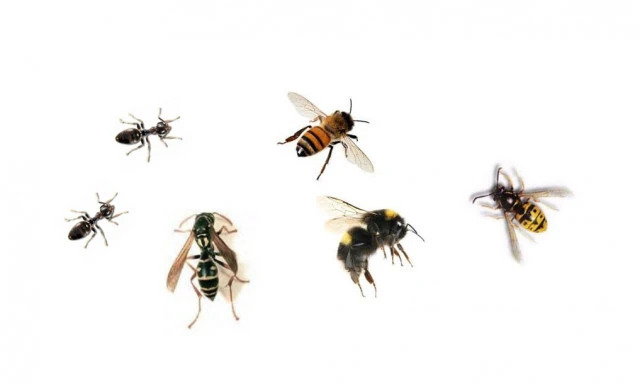Insects that Sting
Wasps and honey bees possess stings they use to protect themselves and their colonies. Bumblebees have stings but will only sting or bite if heavily provoked.
Common and German wasps are regarded as pests both in urban and rural situations but bees, both honey and bumblebees, are regarded as beneficial insects. While care should be taken to avoid bee stings, bees should be protected and encouraged as major pollinators of our crops and flowers.
See Kiwicare NO Wasps Eliminator for the control of wasp nests.
The Sting
The hypodermic sting of wasps and honey bees is inserted through our skin and venom is injected. Pheromone chemical signals are released when a honey bee or wasp stings. The pheromone induces other bees or wasps to also sting. So if you are stung once it is good advice to ‘calmly’ move away from any other wasps or bees.
Honey bee stings are barbed and when a bee flies off or is brushed off, the sting and venom sack is left behind. The bee will die soon afterwards. The sting continues to pump venom and should be scraped out with the use of a finger nail. Do not pinch the sting out as you will squeeze the venom sack and inject further venom.
Wasp stings are not barbed and wasps can sting multiple times. When wasps attack bee colonies to steal their honey this ability to sting many times gives them a considerable advantage in the battle with the bees.
The venom in a single sting will always cause pain but it can also cause life-threatening anaphylactic shock in sensitive individuals. If they are aware of their hypersensitivity to stings such people will carry a supply of adrenalin for rapid administration. Adrenalin can save the life of someone suffering anaphylaxis.
Those that are not hypersensitive to stings can still be threatened by bees and wasps. Honey bees can form colonies of up to 50,000 individuals and Common and German wasps may have several thousand in a nest. These very large numbers can make them a very real threat to life if the nest is disturbed. More than 10 stings can cause serious swelling in most individuals. Medical attention should always be sought if sting sites are near airways where swelling might impede breathing.
Avoid Stings
Bees and wasps only sting when they or their colonies are threatened. Unfortunately, we can induce stinging accidentally, such as in cases of standing or sitting on a bee in the garden or disturbing a wasp nest that has been formed in a compost heap.
Bees are Good
Honey bees are regarded as beneficial insects, not just because of their honey production but because they pollinate many of our crops. Only if a honey bee nest is built in the ‘wrong’ place should it be moved or destroyed. If you have a swarm or nest in a bush in the garden your local beekeeper will often come and collect it at no cost. If the nest is in the eaves of a house or other inaccessible place they can be destroyed, but this should be regarded as a last resort. Any honey store must also be removed or new colonies are likely to move in to take over the nest.
Wasps Steal Honey From Bees
On the other hand, German and common wasps are invasive pests and can build up to large densities, particularly in New Zealand’s native beech forests where they feed on the honeydew extruded by scale insects. They are a threat to New Zealand’s biodiversity. Wasps are also the enemy of honey bees. They will attack bee nests and steal their honey.
Wasp nests can easily be destroyed with NO Wasps Insecticidal Dust puffed into the entrance of the nest.
Biosecurity Risk from Ants
As well as wasps and bees there are ants that bite and then spray the bite wound with venom. There are not many such ants in New Zealand but the recently introducedArgentine Ant is among those that can bite causing irritation. There is also a real risk that biting ants such as Red Imported Fire Ants or Crazy Ants could be brought in to the country and become established. The sting of Fire Ants is painful to both humans and animals. There have been three incursions of Fire Ants in New Zealand since 2001 but these have been successfully eradicated by MPI Biosecurity.
If you suspect you have encountered any of these ants in New Zealand you should contact MPI Biosecurity New Zealand on 0800 80 99 66 immediately.
David Brittain
Kiwicare

